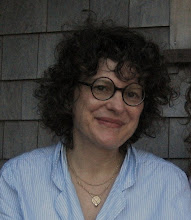
Finished Anna Karenina this morning. Actually I thought I'd finished it the other day when Anna threw herself under the train but ---no---apparently that was not the end of the novel and Tolstoy could only end the whole thing once Levin had a spiritual epiphany in another 60--70 pages. It's interesting that the cinematic ending of her suicide was not the real end-all-and-be-all of the novel. Although it's called Anna Karenina it also is as much a story about Levin who met Anna but once and there was no real narrative interaction between the two other than that they moved in the same circles. Tolstoy just moving on after her death and not allowing us to brood over it was odd. Like Scorcese's The Departed when one of main characters gets shot suddenly and instead of stopping to mourn or take a breath the movie just keeps hurtling on. Of course Tolstoy does not hurtle on, he's more of an ambler but still there is no discussion of her death other than the merest of mentions. No summation.
It was an odd book. I am not sure what I thought.
It was written when a 25 page description of a snipe shooting with absolutely no plot movement or development (except for the snipes) was perfectly acceptable. So many endless descriptions of scenes or encounters just seem superfluous to the story, but then some bits and emotions are so modern and contemporary that they make your heart ache. The self destructive nature of the love in Anna and Vronsky's relationship, the simultaneous warmth and selfishness of Stiva, Levin's complex emotion of pity and fear when his child is born, are all so real and fresh.
All the superfluous description of snipe shooting and political rallies remind me of Jonathan Frantzen's The Corrections with the 35 page description of the knife skills of the chef sister or whatever else he felt like exposing. Or even Philip Roth's exhaustive description of the glove making industry in American Pastoral. So maybe I shouldn't complain, but it seemed that Tolstoy just went on and on needlessly at times and when I could have used some extra detail or discussion---oh say...at THE SUICIDE!!!! he was turned the other way.
In the end what stays with you is the claustrophobia of Anna's choice to give it all up for Vronsky. There is nowhere for her to go in society, she has no outlet, no profession, she's not content as a mother, she has no intellectual pursuits: she's a drug addict, a lousy mother, an adulteress, a flirt ...ultimately there is nowhere to go but under the train. Sadly though a part of your heart goes with her.
It was an odd book. I am not sure what I thought.
It was written when a 25 page description of a snipe shooting with absolutely no plot movement or development (except for the snipes) was perfectly acceptable. So many endless descriptions of scenes or encounters just seem superfluous to the story, but then some bits and emotions are so modern and contemporary that they make your heart ache. The self destructive nature of the love in Anna and Vronsky's relationship, the simultaneous warmth and selfishness of Stiva, Levin's complex emotion of pity and fear when his child is born, are all so real and fresh.
All the superfluous description of snipe shooting and political rallies remind me of Jonathan Frantzen's The Corrections with the 35 page description of the knife skills of the chef sister or whatever else he felt like exposing. Or even Philip Roth's exhaustive description of the glove making industry in American Pastoral. So maybe I shouldn't complain, but it seemed that Tolstoy just went on and on needlessly at times and when I could have used some extra detail or discussion---oh say...at THE SUICIDE!!!! he was turned the other way.
In the end what stays with you is the claustrophobia of Anna's choice to give it all up for Vronsky. There is nowhere for her to go in society, she has no outlet, no profession, she's not content as a mother, she has no intellectual pursuits: she's a drug addict, a lousy mother, an adulteress, a flirt ...ultimately there is nowhere to go but under the train. Sadly though a part of your heart goes with her.

No comments:
Post a Comment